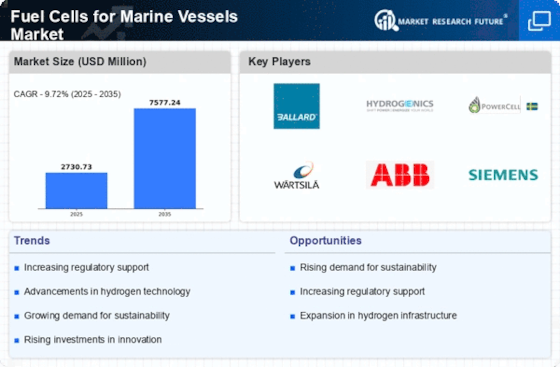Top Industry Leaders in the Fuel Cells Marine Vessels Market

The fuel cells for marine vessels market has become a focal point of innovation and sustainability in the maritime industry. As the world shifts towards cleaner energy alternatives, the competitive landscape of fuel cells for marine vessels is undergoing significant transformations. Key players, adopting diverse strategies, are striving to gain a competitive edge in this burgeoning market.
Key Players in the Market:
Fiskerstr and Verft AS (Norway)
MEYER WERFT GmbH & Co. KG (Germany)
Nuvera Fuel Cells LLC (U.S.)
Dyna International BV (Netherland)
Power Cell (Sweden)
energy A/S (Denmark)
Toshiba Corporation (Japan)
Siemens (Germany)
Proton Motor GmbH (Germany)
Watt Fuel Cell Corporation (U.S.)
Strategies Adopted by Key Players:
Key players are deploying various strategies to solidify their positions and gain a competitive advantage. Partnerships and collaborations are prevalent, fostering technological advancements and widening market reach. Ballard Power Systems, for instance, has engaged in strategic partnerships with ABB, Siemens, and others to enhance its product offerings and market presence. Plug Power's acquisition of Hydrogenics has strengthened its position in the fuel cell market, allowing for a more comprehensive approach to marine applications.
Factors for Market Share Analysis:
Market share analysis in the fuel cells for marine vessels segment is influenced by several factors. Technological innovation and product development play a pivotal role, with companies investing heavily in research and development to stay ahead. Cost-effectiveness and efficiency of fuel cell systems are also critical factors, impacting the market share of each player. Additionally, strategic alliances and collaborations contribute to market share growth, enabling companies to tap into new markets and customer bases.
New and Emerging Companies:
The market is witnessing the emergence of new players focusing on disruptive technologies and novel approaches. Nuvera Fuel Cells, for example, is gaining recognition for its advanced fuel cell systems. Loop Energy, with its focus on heavy-duty transportation, is making strides in the marine sector. These emerging companies bring fresh perspectives, intensifying competition and driving innovation in the fuel cells for marine vessels market.
Industry News:
Recent developments in the fuel cells for marine vessels industry reflect the dynamic nature of this market. Regulatory support for clean energy initiatives is a key driver, with governments globally incentivizing the adoption of fuel cell technology in maritime applications. Notable advancements include the successful testing of fuel cell-powered vessels, such as the passenger ferry "HySeas III" in Scotland. These milestones underscore the industry's progress and instill confidence in stakeholders about the viability of fuel cells for marine propulsion.
Current Company Investment Trends:
Investment trends in the fuel cells for marine vessels market reflect the growing optimism and financial backing for green maritime solutions. Companies are allocating substantial resources to research and development, aiming to bring forth innovative fuel cell solutions. Financial investments, both from private and public sectors, are fueling the expansion of manufacturing facilities and the development of scalable fuel cell technologies. The investment landscape underscores the industry's potential for growth and signals confidence in the long-term viability of fuel cells in the maritime sector.
Overall Competitive Scenario:
The competitive scenario in the fuel cells for marine vessels market is marked by a balance between established players, emerging innovators, and collaborative ventures. While established companies continue to consolidate their market share through strategic partnerships, newer entrants are disrupting the status quo with agile and forward-thinking approaches. The industry's overall landscape is characterized by a commitment to sustainability, as companies strive to develop efficient, cost-effective, and environmentally friendly fuel cell solutions for marine applications.
Recent News :
Ballard Power Systems:
January 27, 2024: Announced a major partnership with Hyundai Heavy Industries to develop and supply fuel cell power systems for large container ships, marking a significant step towards decarbonizing ocean freight.
November 15, 2023: Successfully completed the maiden voyage of the world's first hydrogen-powered passenger ferry, showcasing the viability of fuel cells for passenger transportation.
ABB:
December 22, 2023: Launched its Megawatt-scale Marinpower Fuel Cell System, offering high power capacity for larger vessels like cruise ships and ferries.
September 29, 2023: Signed a collaboration agreement with a major shipping company to develop and pilot fuel cell-powered container ships, paving the way for wider industry adoption.
PowerCell Sweden:
January 13, 2024: Secured a contract to supply fuel cell systems for a fleet of inland waterway vessels in Europe, highlighting the versatility of fuel cells for different vessel types.
October 24, 2023: Unveiled its next-generation marine fuel cell stack with improved efficiency and durability, further enhancing the competitiveness of fuel cell technology.
Other noteworthy news:
Toyota: In December 2023, Toyota announced plans to invest in a large-scale hydrogen production and bunkering facility in Japan, supporting the development of a hydrogen-fueled maritime ecosystem.
Mitsui O.S.K. Lines (MOL): In November 2023, MOL launched the world's first ammonia-powered tanker, marking another alternative fuel option for decarbonizing shipping.


